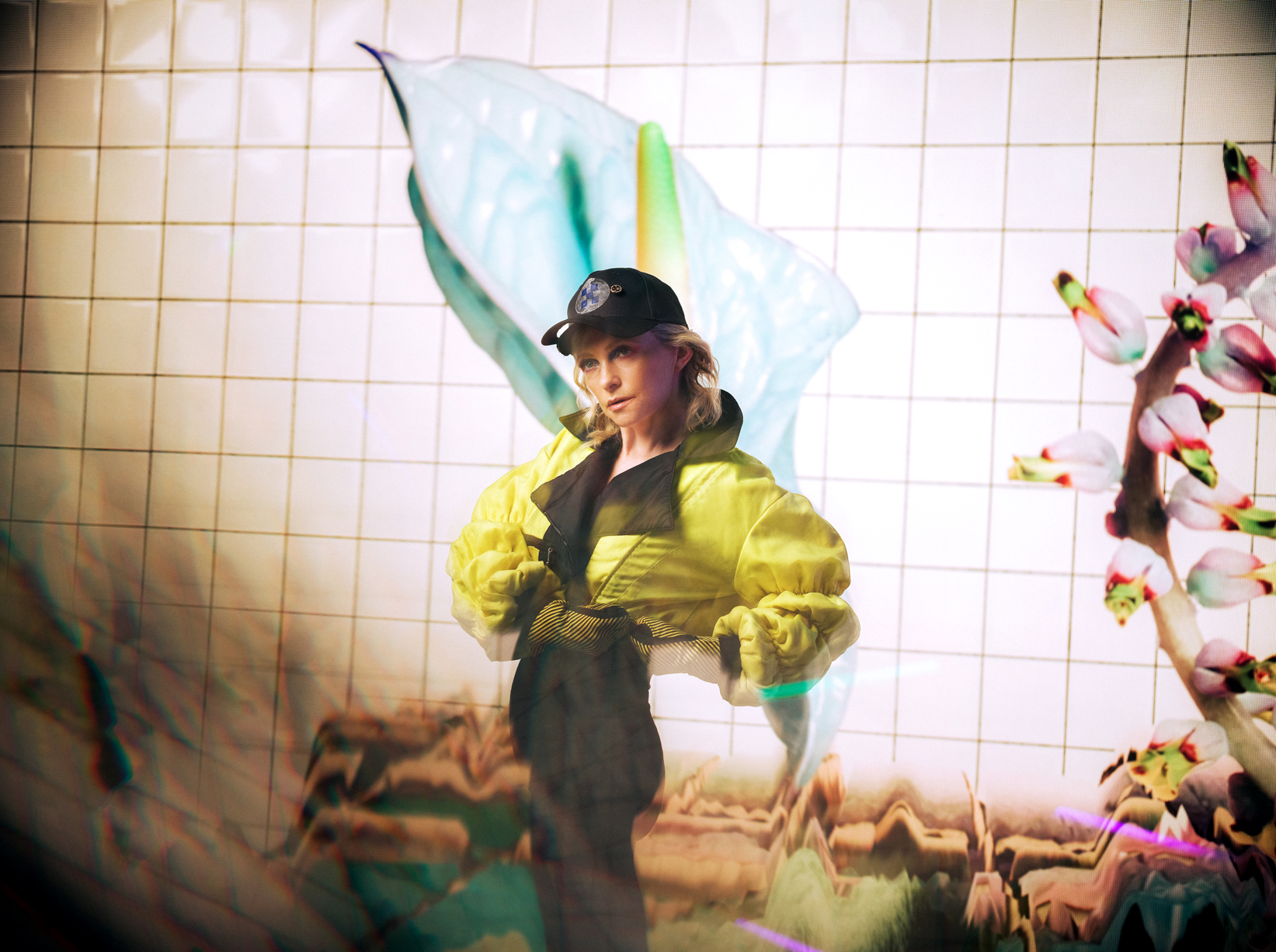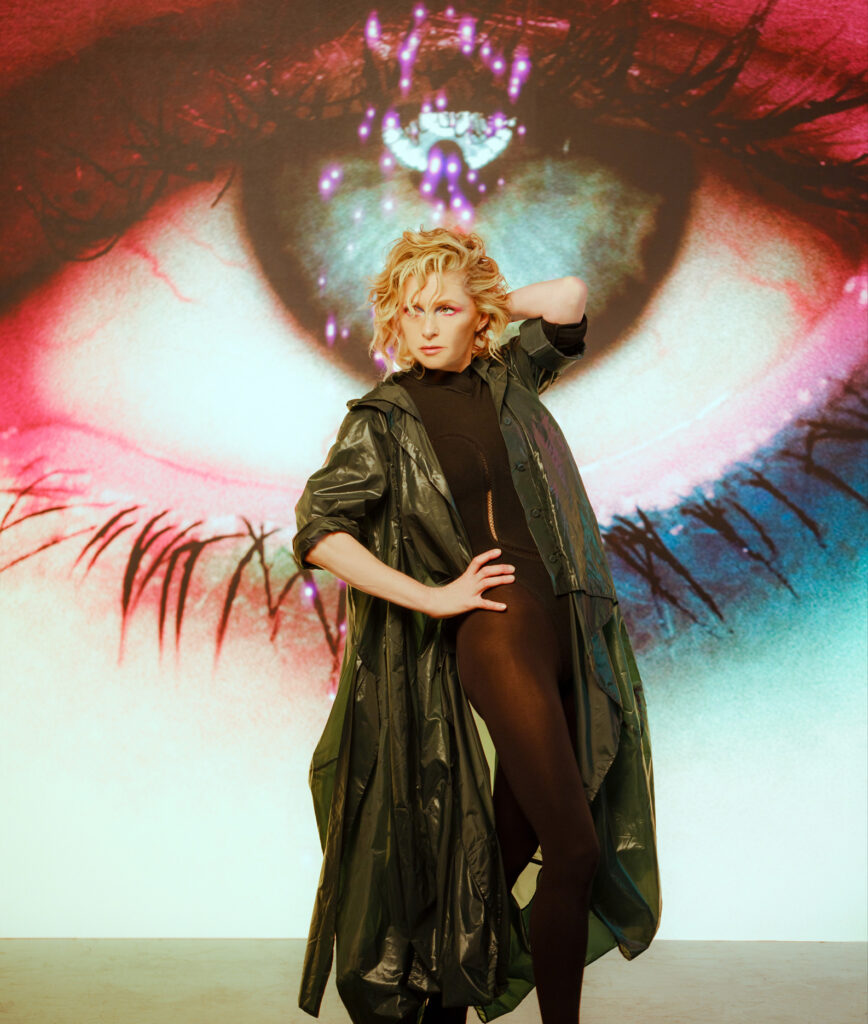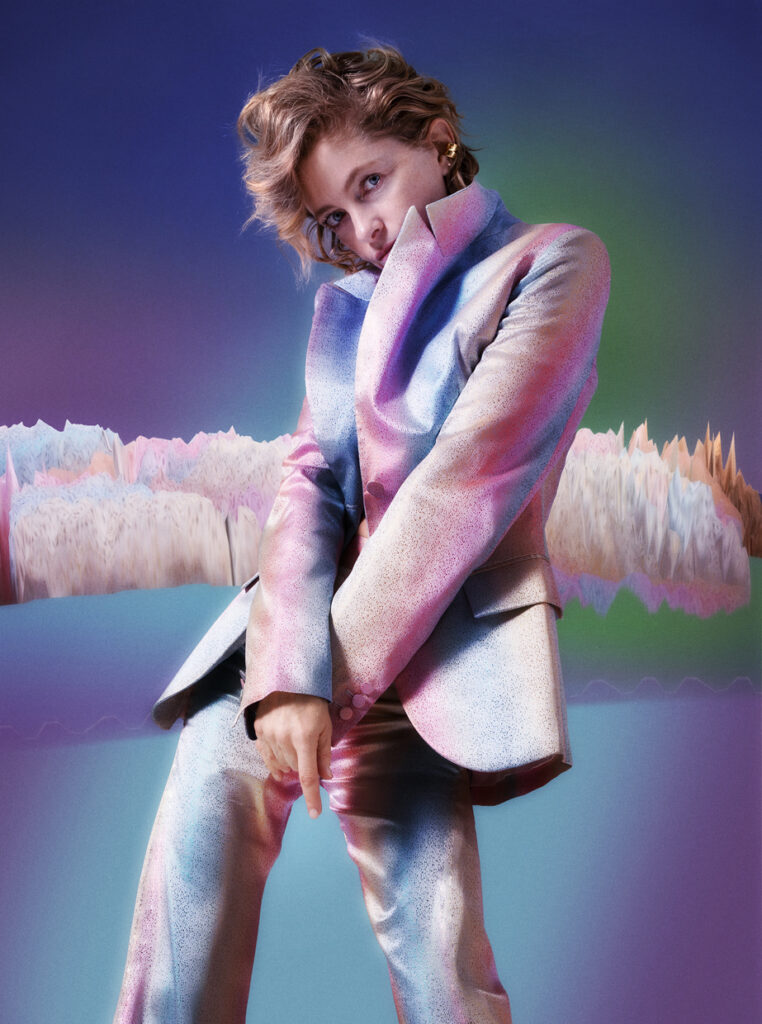Alison Goldfrapp is at the start of a shiny new era
After a stunning run of albums as one half of electro-folk chameleons Goldfrapp, ethereally voiced frontwoman Alison Goldfrapp is going it alone — and bringing her prerequisite polish to a fresh, fabulous new era

‘Why shouldn’t pop music be intelligent?” I wonder aloud.
“Quite” replies intelli-pop alchemist Alison Goldfrapp, with a raised eyebrow and a concise, authoritative tone that recalls a schoolteacher you’d trust with your life. “I’ve always thought the best pop songs are the best songs,” she continues. “When they’re great, they’re beyond.”
She’d know. From the robotic beats of ‘Strict Machine’ to the assertive synths of ‘Ooh La La’, and the pastoral simplicity of ‘A&E’ to the fizzy rush of ‘Rocket’, Goldfrapp’s singles discography has raised the bar of 21st-century British pop music. And while Alison and bandmate Will Gregory’s sparkling, genre-flipping oeuvre (seven studio LPs including five UK top-10 albums and their worldwide million-selling crowning glory, Supernature) famously caters for dance, indie and even classical music-lovers, their most fervent fan base is the Popjustice-lurking genre nerd for whom prestigious pop music is a religion.
So, what is this one of this century’s most prolific tastemakers listening to of late? “Tove Lo: ‘No One Dies from Love’, over and over,” Alison replies. “I absolutely love that song. It’s so good. Very electronic. It’s dancey, it’s pop, it’s Scandi. It’s such a great tune.” Goldfrapp’s spiritual ascendancy is right there in Tove’s 2022 single, of course… And it’s also evident in Alison’s long-awaited debut solo album, The Love Invention, out this May. “Better late than never!” laughs Alison. “Did I want to do it sooner? I think I probably have. But I felt it wasn’t quite the right time.”
Her work with Norwegian electronic music duo Röyksopp, which birthed moodily atmospheric dance tracks last year, helped prompt the new era. “It was part of it,” she recalls. “I did think, ‘I’d love to do some things with other people. What have I got to lose? All they can do is say no.’” Staggeringly, some turned her down indirectly. “It’s quite interesting — I asked a few people who didn’t even bother responding at all,” she admits. “I won’t say who they are. I was slightly offended by that. You think: ‘That’s a bit rude.’ Now, I always make a point, if someone reaches out to me — it doesn’t matter what I think of them — I make the point of answering.”
Among the producers who did lend a hand are James Greenwood aka Ghost Culture (Daniel Avery, Kelly Lee Owens), Toby Scott (The Gossip, Annie) and Richard X (Pet Shop Boys, Róisín Murphy). “He’s amazing, Rich,” Alison reflects. “He’s got a great sensibility. And he’s so fucking quick! Super-efficient. And I really like the way he applies himself to things. He’s committed to music and making music. He puts everything into it. I have huge admiration for that. And he’s got a wide knowledge of music and played me some fun things when we were together that I hadn’t heard before that were really inspiring. It was great working with him on the arrangements and production. But a very different way of working.”

One person missing, obviously, is Alison’s old bandmate Will. “Will’s great — he’s very supportive of what I’m doing,” Alison explains. “We might well end up doing something together again at some point. He’s always done other various little things since the beginning, actually — film projects, his Moog orchestra [The Will Gregory Moog Ensemble], so, it’s not new for him — it’s new for me.”
“Will and I met through a friend of Adrian Atley of Portishead,” Alison recalls of Goldfrapp’s genesis nearly 25 years ago. “His friend heard something I’d been doing with some guys in Bristol, a little tune I’d written. She said, ‘You’ve got to hear this,’ and he was like, ‘Oh, that’s interesting.’ So, we got in touch with each other and the first thing we ever wrote together was ‘Lovely Head’.”
With its coolly batshit lyrics about the decapitation of a handsome crush (“Frankenstein would want your mind…”), ‘Lovely Head’ was Goldfrapp’s debut single and the opener on their Mercury Prize-nominated first album Felt Mountain. A folksy-electro swirl of a song that’s as mysteriously cinematic as any Bond track, it arguably served as a tasting menu of all the genre expansionism to come. But Alison always seemed nonplussed by the public’s surprise and preoccupation with Goldfrapp’s shifting sound — “Yeah, and?” her facial expression seemed to say — because, for her and Gregory, mastery of music is not a novelty or a circus trick, but a state of being.
Now, on The Love Invention,it’s Alison’s production prowess that dominates. The record is a self-referential swag in the same way that Lana Del Rey sampled her own song ‘Venice Bitch’ on 2023’s ‘Taco Truck x VB’. Similarly, Alison’s new era is turbocharged by self-reflection; by the summoning at will of a rich, prolific legacy, because, well, it’s yours, so why not? ‘So Hard So Hot’, for example, has the disco squelch of Supernature, ‘SloFo’ the hazy melancholy of Felt Mountain and ‘NeverStop’ the playful, dancey house of Head First.
“It’s funny, I wouldn’t have thought of Head First,” says Alison of Goldfrapp’s underappreciated 2010 collection of tinny 80s stompers and the band’s first LP to be criticised as safe and predictable. She instead likens The Love Invention’s “chic” sound to that of Supernature, opining: “It’s more dance, electronic, pop than anything Goldfrapp did.” I’m admittedly surprised she welcomes Goldfrapp comparisons at all, rather than finding them reductive, and as such, had steeled myself for the icy dominatrix stare of a ‘Black Cherry’-era music video. Not a bit of it. In 2023, it’s good vibes only, as Alison beams with pride and excitement in her new music and life in general.
“There’s a certain confidence I’ve gained,” the London-born star explains. “Lockdown sort of forced a new independency that I hadn’t really experienced in the same way before. It forced me to set up a studio in my home and to do things independently. And through that, it gave me a new confidence — ‘Oh, I can experiment a bit more.’ ‘Oh, I can reach out to that person and say, do you fancy doing something?’ I felt like it was a time to try out new things.”
Songs such as ‘NeverStop’ and ‘Digging Deeper Now’ explore themes of personal evolution with a bright, invigorating force that’s perfect for a spring playlist. “Everything has changed / In my head / In my heart / In my veins,” she sings on the latter. “That lyric came about after lockdown, a feeling of: ‘Yeah, everything’s changed. I’ve changed. Everything around me has changed,’” she explains. “Personally, I feel like I’ve changed. Physically, I feel like I’ve changed. So many things. It felt like a very simple, direct way of explaining it. You sense these things, don’t you, but you’re not necessarily able to articulate everything that you’re feeling.”

Interestingly, because they’re all so markedly different, we’d posit there’s a Goldfrapp album to explain any feeling — if not anything and everything. (The rain today is very Tales of Us, for example; fitting, then, that The Love Invention was briefly named Strange Weather.) But in its hopeful elation, the solo LP stands in stark contrast to the moody darkness apparent in most Goldfrapp music, right up to 2017’s Silver Eye.
The Love Invention is a cohesive record with a singular, dancefloor-ready vibe. “When you start, you have an idea of what it’s going to be like, and quite often that changes,” says Alison of the self-editing involved in creating music. “The process of writing, hearing things… But I was quite focused with what I wanted it to sound like. I was thinking, ‘How far do I want to go with this? Do I want to put strings on it?’ Then I thought, ‘No, I don’t want to do that. It’s OK. I’ve done that. I don’t need to do that.’ I got more confident as I went along: ‘I’m focused. I can dabble with that later.’”
It’s threaded together by Alison’s trademark ethereal vocal and, I venture, a sense of romantic ecstasy. “Yeah, there is someone special in my life, it’s true,” she tells me. “I’m just in a happier place generally. I feel like so much has changed. I feel like I’m much more aware of time and enjoying the now. Trying to separate myself from a lot of old shit. So, there’s lots of love in different ways. Not just with the person I’m with.”
I’m reluctant to linger on Alison’s personal life further, having just watched Meet Me in the Bathroom, a music documentary about the early 00s NYC indie scene that explores the misogynistic bias faced by the Yeah Yeah Yeahs’ Karen O back in the day. Alison has similar memories. “I remember this guy saying to me once: ‘You’re 40 now and still wearing miniskirts. Do you think that’s acceptable?’ I laugh because I’m like: ‘What?!’ Who says you have to stop wearing short skirts at 40? The last time I was doing some interviews in France was slightly problematic, too. Often, I was with Will, and they’d ask me about my dress, which is fine, but just talk to Will about the music. And completely ignore me. Which used to really piss me off…”
Ageism has followed Alison throughout her career, given that she first found chart success in — shock horror! — her 30s. (“Kind of late, really.”) Not that it did Blondie’s Debbie Harry any harm. “I’ve always looked to her and thought, ‘Thank God, there’s someone else who did all right later in life!’” she says. “I’ve always felt like a late developer in absolutely everything. And here I am doing a solo album at 57! I still feel like a silly, young idiot. It’s weird as you get older — you feel older, but at the same time you so don’t… it’s so weird. You bounce through life thinking: ‘I don’t know jack shit!’ Then you go: ‘Oh my God — but I look like this!’ It’s feeling one thing but looking like another thing.
“We all feel vulnerable, living in a world where we think, ‘What the fuck is going on?’” she continues. “Our world now feels so unstable most of the time. It’s so scary. But you also feel surer and more confident about yourself as you get older. There’s something really lovely about that. It’s a contradiction all the time, I think. It’s brilliant as well, because you never want to stop looking at the world and going, ‘Oh my God… That’s so amazing.’ Feeling like you’re still finding out stuff you never knew about. It’s this constant evolving.”
It’s cheering to see that Alison, once perceived as so stoic and serious, has not lost touch with the child within. Or her awesome sense of humour, as she proves while descending into giggles recalling a fraught conversation over what to call her solo act.
“Tricky said to me: ‘Are you gonna do your own stuff?’” she remembers. She then impersonates a moody, defensive toddler. “I said: ‘…YEAH!’ He said: ‘What are you gonna call yourself?’ I said: ‘Alison Goldfrapp!’
“He goes: ‘Goldfrapp?! You can’t call yourself that!’ I thought, ‘That’s it… I’m definitely calling myself that!’”
